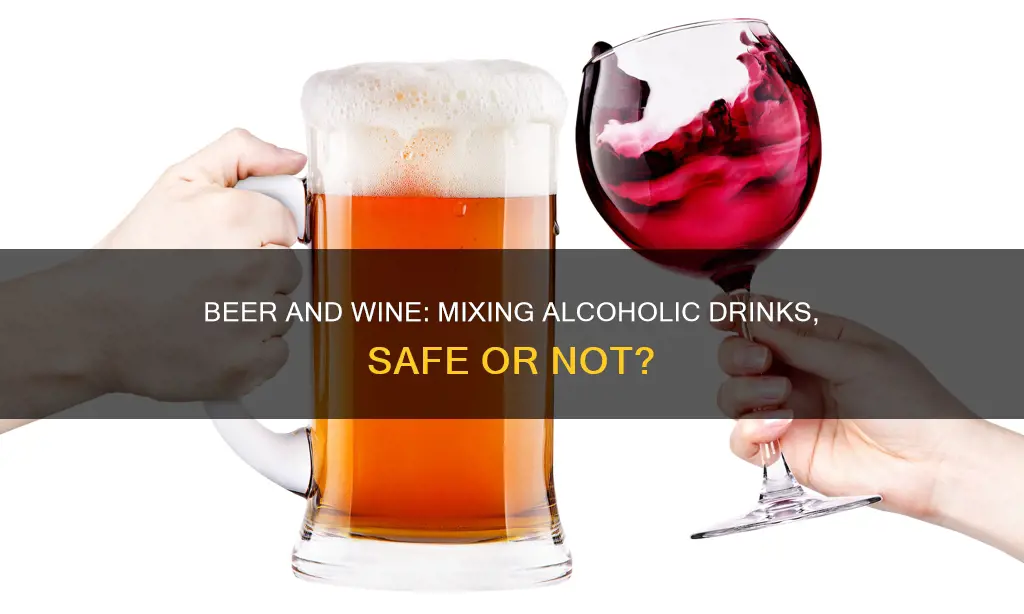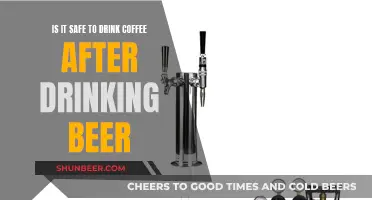
There is an age-old saying that goes, beer before wine and you'll feel fine; wine before beer and you'll feel queer. But is there any truth to this? Well, researchers at Witten/Herdecke University in Germany and the University of Cambridge in the UK decided to find out. They conducted a study with 90 volunteers between the ages of 19 and 40, who were split into three groups with different drinking orders. The results showed that the order of drinking beer and wine did not significantly affect the severity of hangovers. So, whether you drink beer before wine or vice versa, you're still likely to be hungover if you overindulge.
| Characteristics | Values |
|---|---|
| Total amount of alcohol consumed | Has a much bigger effect on how you feel than the specific order of drinks |
| Carbonation in beer | May make you absorb alcohol more quickly, leading to worse hangover |
| ABV | Beer usually has a lower ABV than wine or spirits-based drinks |
| Volume | Beer is usually larger in volume than wine or spirits-based drinks |
| Scientific evidence | Little evidence to suggest that drinking types of alcohol in a specific order can decrease the chances of a hangover |
What You'll Learn

Beer before wine, you'll be fine
"Beer before wine and you'll feel fine; wine before beer and you'll feel queer." This is a popular saying that many of us have heard, and perhaps even used, to guide our drinking choices. But is there any truth to it?
Well, it turns out that this age-old adage may not hold much weight after all. A study by researchers at Witten/Herdecke University in Germany and the University of Cambridge in the UK set out to scientifically evaluate whether drinking beer before wine or vice versa had any impact on hangover severity. The study involved 90 volunteers between the ages of 19 and 40, who were divided into three groups with different drinking orders. The results? It didn't matter whether they drank beer before wine or vice versa—if they drank too much, they still felt ill the next day.
So, while the saying "beer before wine, you'll be fine" may be catchy and fun to recite, it doesn't seem to be based on scientific evidence. The total amount of alcohol consumed and individual factors like genetics, drinking on an empty stomach, and not drinking enough water are more likely to influence how you feel the next day.
However, it's important to remember that drinking too much alcohol is never recommended, and hangovers can have negative consequences on our productivity, performance, and ability to perform daily tasks. So, while the order of your drinks may not matter, it's always a good idea to drink responsibly and in moderation.
In conclusion, while the saying "beer before wine, you'll be fine" may be a fun rhyme, it's not a guarantee for avoiding a hangover. The best way to avoid feeling unwell after drinking is to pay attention to your body, drink responsibly, and listen to those "red flags" that signal you may be drinking too much.
Beer and Amoxicillin: Is It Safe to Drink?
You may want to see also

Wine before beer, you'll feel queer
"Wine before beer, you'll feel queer" is a popular drinking adage that suggests the order in which you consume alcoholic drinks matters when it comes to avoiding a hangover. The saying goes: "Beer before wine and you'll feel fine; wine before beer and you'll feel queer." However, scientific studies have shown that this age-old aphorism may not hold much truth.
The belief that drinking wine before beer will lead to a worse hangover has been widely debated and even inspired a study by researchers at Witten/Herdecke University in Germany and the University of Cambridge in the UK. The study aimed to evaluate whether this time-honored wisdom had any impact on reducing hangover severity. Ninety volunteers between the ages of 19 and 40 were recruited and divided into three groups with different drinking orders: beer followed by wine, wine followed by beer, and a control group that consumed only one type of drink. The study used a crossover design, allowing participants in the first two groups to switch their drinking orders a week later.
The results of the study revealed that the order of alcoholic drinks had no significant impact on hangover severity. Hangover symptoms were primarily influenced by how drunk the participants felt and whether they vomited, regardless of the type or order of drinks consumed. This finding aligns with the understanding that alcohol is absorbed efficiently and rapidly, regardless of the specific beverage.
While the saying "wine before beer, you'll feel queer" may not hold scientific merit, it is worth noting that excessive alcohol consumption, regardless of the order or type of drinks, can lead to a hangover. The best way to avoid a hangover is to drink responsibly, know your limits, and avoid drinking to the point of feeling drunk or vomiting.
In conclusion, while the adage "wine before beer, you'll feel queer" has persisted for a long time, scientific evidence suggests that the order of drinking beer and wine does not significantly affect the severity of a hangover. The key factor in preventing hangovers is responsible drinking and being mindful of one's alcohol consumption.
Lovastatin and Beer: A Safe Mix?
You may want to see also

Grape or grain, but never the twain
"Grape or grain, but never the twain" is a phrase that warns against drinking wine and beer together. It is a variation of the saying, "beer before wine and you'll feel fine; wine before beer and you'll feel queer", which suggests that drinking beer before wine will result in a milder hangover than the other way around.
However, this idea has been debunked by a study from the University of Cambridge and Witten/Herdecke University in Germany. The study found that the order of drinks did not affect the severity of hangovers. Instead, it concluded that drinking too much alcohol, regardless of the type or order, is likely to result in a hangover. The best predictors of a bad hangover are how drunk one feels and whether they vomit after drinking.
The belief that drinking beer before wine will lessen a hangover may be based on a few theories. One idea is that carbonation in beer causes faster absorption of alcohol from wine, leading to increased intoxication and a worse hangover. Another theory suggests that drinking hard liquor first overwhelms the body's liver enzymes, and drinking beer first decreases these enzymes. When hard liquor is consumed after beer, the liver is overwhelmed and cannot generate enough detoxification enzymes, resulting in a significant hangover.
Despite these theories, the Cambridge and Witten/Herdecke University study found no evidence to support the concept of avoiding hangovers by drinking beer before or after wine. The total amount of alcohol consumed has a much bigger impact on how one feels than the specific order of drinks.
Beer and Covid 19: What's Safe to Drink?
You may want to see also

Amount of alcohol consumed matters more than the order
The saying goes, "beer before wine and you'll feel fine; wine before beer and you'll feel queer." However, the amount of alcohol consumed matters more than the order in which you drink it. A study by the University of Cambridge found that participants who consumed two and a half pints of beer followed by four large glasses of wine did not have significantly different hangover scores from those who consumed the same amount of alcohol in the reverse order. The study concluded that "drinking too much of any alcoholic drink is likely to result in a hangover."
The severity of a hangover is influenced by various factors, including dehydration, immune response, metabolism, and hormone disturbances. Additionally, ingredients other than alcohol content, such as colorings and flavorings, can make hangovers worse. For example, Bourbon tends to cause more severe hangovers than vodka, despite having the same alcohol concentration.
According to Dr. Harvey Allen, a gastroenterologist, drinking hard liquor first can overwhelm the body's liver enzymes. On the other hand, starting with beer decreases these liver enzymes, and when hard liquor is ingested afterward, the liver is overwhelmed, leading to significant hangover symptoms. However, there is little scientific evidence to support these claims, and the saying remains a folk remedy.
Another theory suggests that carbonated beverages like beer and Prosecco can irritate the stomach lining, causing faster alcohol absorption and increased sensitivity to subsequent spirits. This theory is supported by research from 2007, which showed that most subjects absorbed vodka faster when mixed with carbonated water.
Ultimately, the total amount of alcohol consumed will have a much bigger effect on how you feel than the specific order of drinks. It is important to drink responsibly, never drive under the influence, and know your limits to avoid unpleasant hangovers.
Watermelon, Beer, and Death: A Curious Combination
You may want to see also

Hangover symptoms and severity
Hangovers are a set of symptoms that occur as a consequence of drinking too much. Typical symptoms include fatigue, weakness, thirst, headache, muscle aches, nausea, stomach pain, vertigo, sensitivity to light and sound, anxiety, irritability, sweating, and increased blood pressure. The severity of these symptoms can vary from person to person.
The order in which you consume your drinks does not matter as much as the total amount of alcohol consumed. A 2019 study at Cambridge University found that volunteers who consumed two and a half pints of beer followed by four large glasses of wine reported just as bad a hangover as those who had the wine first and then the beer.
However, certain factors can increase your chances of having a bad hangover. Drinking on an empty stomach and not staying hydrated are two such factors. Additionally, the type of alcohol consumed can also play a role. For example, red wine and darker spirits tend to have higher levels of congeners, which are compounds produced during fermentation that contribute to the taste and smell of alcoholic beverages. Congeners are believed to be responsible for more intense hangovers, although the exact reason is not yet known. Sulfites, which are added to wine as preservatives, can also cause headaches, especially for people with allergies or sensitivities.
To ease hangover symptoms, getting sleep, drinking water, eating, and taking over-the-counter pain relievers can help. However, the only surefire way to avoid a hangover is to drink in moderation or abstain from drinking altogether.
Non-Alcoholic Beer: A Safe Drink for Diabetics?
You may want to see also
Frequently asked questions
No, it is not true. A study by the University of Cambridge found that the order of drinks does not matter. Drinking too much alcohol will still lead to a hangover.
There are a few theories. One suggests that carbonation in beer makes the body absorb alcohol from wine more quickly, leading to worse hangovers. Another theory relates to alcohol by volume (ABV) – beers are usually larger in volume but have a lower ABV, so it takes longer to drink a beer than a spirit or cocktail, giving the body more time to flush out the alcohol.
There are no effective remedies for hangovers. The best way to avoid a hangover is to drink responsibly and know when to quit.
Hangover symptoms include fatigue, weakness, excessive thirst, dry mouth, headache, muscle aches, nausea, vomiting, light sensitivity, shaking, and mood disturbances.







